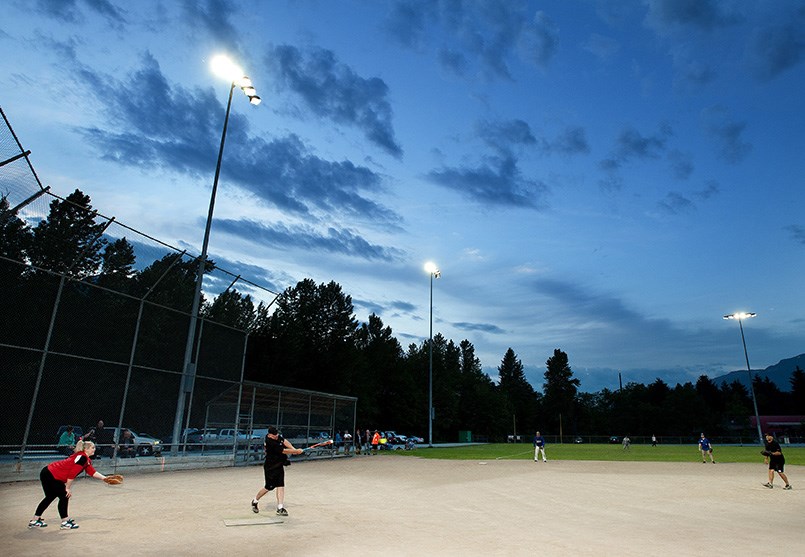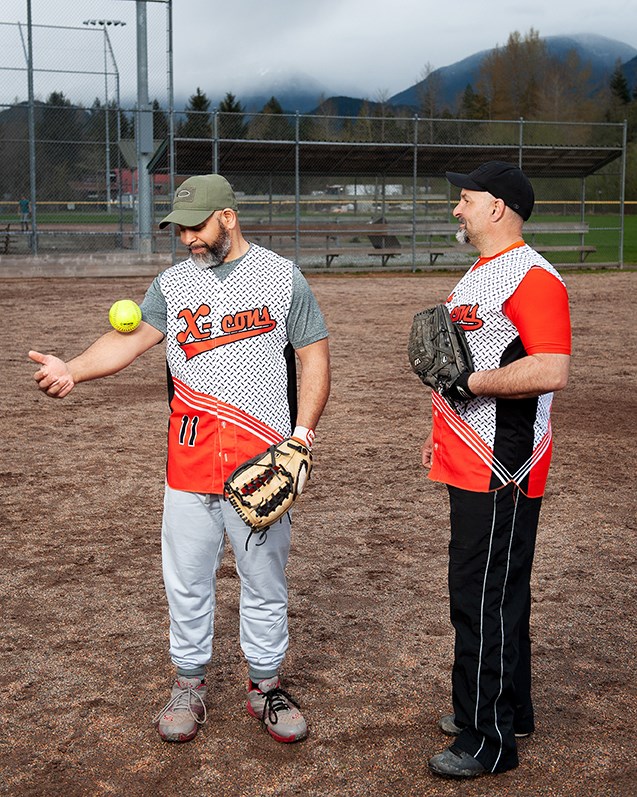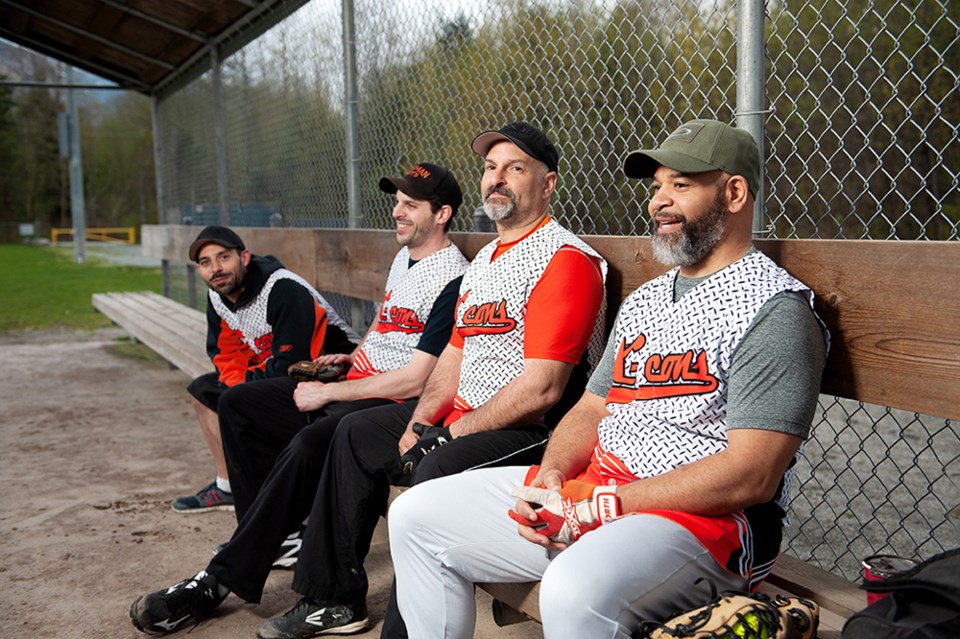What image does slow pitch softball conjure up for you? Is it long lazy summer evenings at Henderson Park with good friends?
If not, then clearly you’ve never played slow-pitch softball in Squamish (or perhaps anywhere else.)
“I grew up playing ball sports, and my wife played competitive fast pitch, so playing slow pitch together just came naturally,” says Daryl McCullough about the Squamish Slo Pitch league. He’s a transplanted North Carolinian, who moved to Squamish for love, then fell in love with the area. A big part of that social experience locally was with Squamish Slo Pitch.
“It used to be the unofficial rule that we all went to the Legion for a beer afterward,” said McCullough, who has been playing in the league since 1994, and estimates it dates back to the early 80s. “It was before my time, but some of the original players are still playing,” said McCullough, who besides being a veteran player with the league is also the senior umpire.

Even league president, Paul Dosanjh, is unsure of the exact date of the league’s inception, and he’s been playing since 1989.
“I’m not sure, but the league has been around a long time,” said Dosanjh. He’s been president for the past six years and says the social aspect of Squamish Slo Pitch, and slow pitch in general is tough to beat.
“We have a May long weekend tournament that is open to teams from the Lower Mainland, we already have 20 teams signed up, it’s a very popular tournament for teams from all over, to come up here and play,” said Dosanjh.
Slow pitch is a coed league, with teams fielding a minimum of four women, explained Dosanjh. Although he adds, there’s no rule against playing more than four women.
“Some teams go with five and five, and even though it’s a pretty social league, we are competitive.”
McCullough echoes that, saying, “We definitely want to win more games than we lose, and in my humble opinion usually, it’s the ladies who make the team, if you have strong women players you’re competitive.”
Slo Pitch Softball is a national association, and again McCullough stresses, while the games are fun and the atmosphere laid back, they are competitive.
“All of our umpires are trained and registered [with the national association]. The skill level is broad, which is why we have three divisions, A, B and C. A is the top division, C is novice.” He added that the two top teams in the lower divisions move up at the end of the season.
That would be the spring season, which runs from April to July, followed by a more informal fall season that runs from August to late September.
“We started the fall season to get more people playing,” said Dosanjh. “We wanted to get new teams started, and most people who try it out in the fall, usually stick with it and come back in the spring.”
But finding ways to attract players to the league was not always necessary.
“There used to be 40 teams locally [down to 27 this year], which was the maximum number we could field, and there was a waiting list to join,” said Dosanjh.
McCullough puts the decline in local engagement with the league down to changes in the town’s makeup.
“We took some hits when BC Rail closed down, and with Interfor and Woodfibre closing our numbers started to come down.” But he says, the league has staying power, noting that two teams, the Rebels, and the Brewjays have been around since the early 90s.
Dosanjh puts the decline in Slo Pitch League numbers down to changing priorities.

“A lot of families are really committed to their kids’ sports and that takes up their time. Then there’s mountain biking, pretty much everyone up here owns a mountain bike, and there’s lots of scenery to see.”
Still, both men note, the league has broad appeal, with players’ ages ranging from 16 to 60 — the league mandates players be a minimum of 18 years of age, but allow for a certain number of underage players with parents’ permission.
“We had one team that all started when they were 17 to 18, they’re still playing, and they’re all in their 20s now,” said Dosanjh, who estimates the average age of players in the league at mid-30s.
He adds that the decline in numbers over the years, the league is still very active in maintaining local infrastructure.
“We raised $160,000 for lights at Henderson Park,” said Dosanjh, which allows them to play almost every night rain or shine. Saturday is their only non-playing day.
If you’re interested in becoming a player, or just want to check out slow pitch, they play Monday to Friday evenings starting at 6:30 p.m., and all day Sunday starting at 11 a.m.
“Some teams are still looking for players, and you’ll probably get picked up pretty quick if you’re interested,” said Dosanjh.
The more traditional way to get involved with slow pitch is to form a team and apply, but to do that you’ll have to wait until August and the start of the fall season.
But both welcome people to come check out slow pitch, meet new people and perhaps try a sport that doesn’t involve going down a mountainside fast. That, plus there’s beer.
If you want to find out more about Squamish Slo Pitch, you can check out the league’s Facebook page.
Slowpitch vs. Fastpitch Softball
• Slow pitch uses a larger, softer
and heavier ball
• In slow pitch, the pitcher doesn’t
use the windmill motion
common in fast pitch
• Bunting is not allowed in slow
pitch
• There is typically less freedom to
steal bases in slow pitch
• Innings are typically longer and
result in more runs in slow pitch
~ from www.gogglesnmore.com



